
Italian conjugation chart PDF for Italian verb conjugation
Stare literally means "to stay," but it's also one of two Italian verbs that can mean "to be"* when talking about 1) Health Per esempio… 2) Permanent or habitual location Stare per + infinitive = very near future Stare is also used with the gerund to form progressive tenses (lessons coming soon). Stare present tense conjugations

The Italian verb "Stare" YouTube
Sta is used as a conjugation of the formal you, voi. Conjugation of certain tenses like this'll also be covered in its own section later in this post, so keep on reading to find out more. Something else that's important to remember is that stare is an irregular verb.

10 WAYS to use STARE in the PRESENT (Italian Verbs) YouTube
Stare Italian verb conjugation | Conjugate verb stare | Verbo Italiano Italian Verbs Conjugation Type the verb you wish to conjugate (ie: mangiare, dormire, amare) stare Indicativo Presente io sto tu stai lui sta noi stiamo voi state loro stanno Passato Prossimo io sono stato tu sei stato lui è stato noi siamo stati voi siete stati loro sono stati

The present tense of the verb "STARE" In Italian this verb can be
The Italian irregular verb stare has three usages and meanings:. as a standalone verb, it means "to stay" in a precise location*;accompanied by an adjective, it expresses a physical or mental status;; accompanied by a verb (especially in the gerund mood), it means "to be in process of doing something".*In this case the verb essere can be used with the same meaning as "to stay" but it has a.
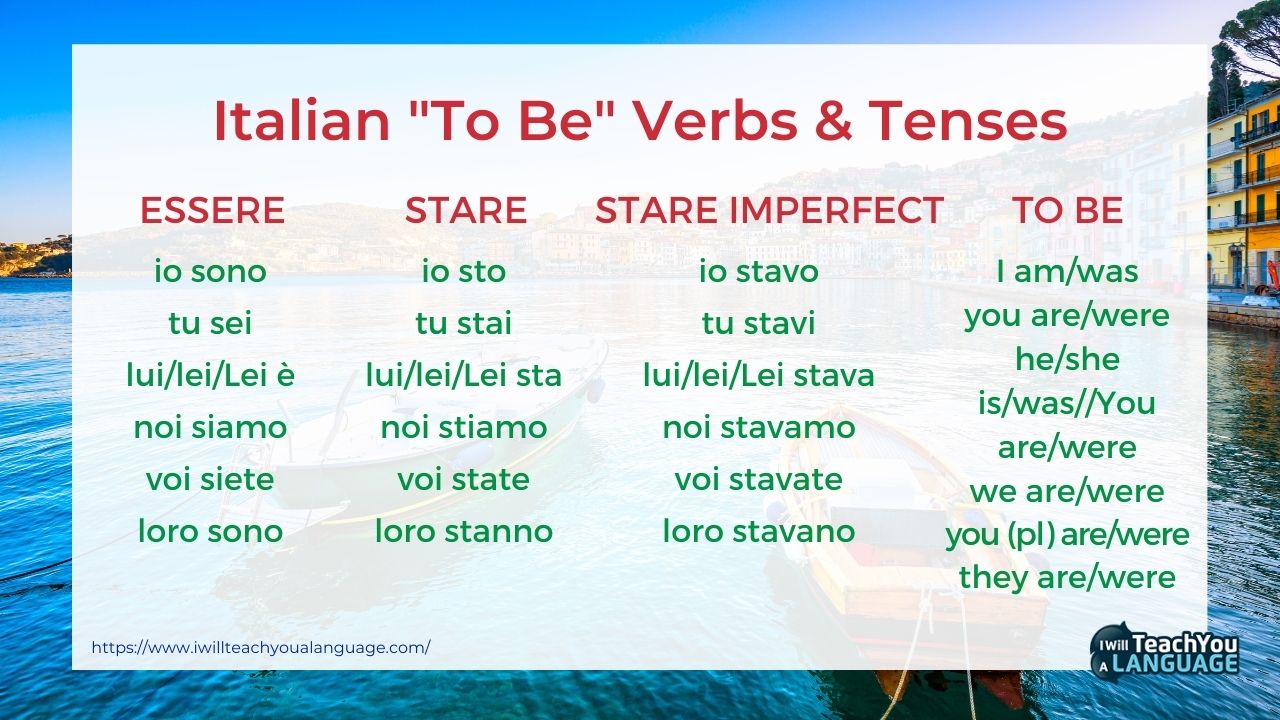
Italian Irregular Verbs StoryLearning
Passato Imperative Verbs conjugated like stare instare, istare, ristare, soprastare, sottostare, stare, Translations abide, stay stay, stay stay, to remain in a particular place remain, to stay behind while others withdraw Synonyms & Antonyms Synonyms
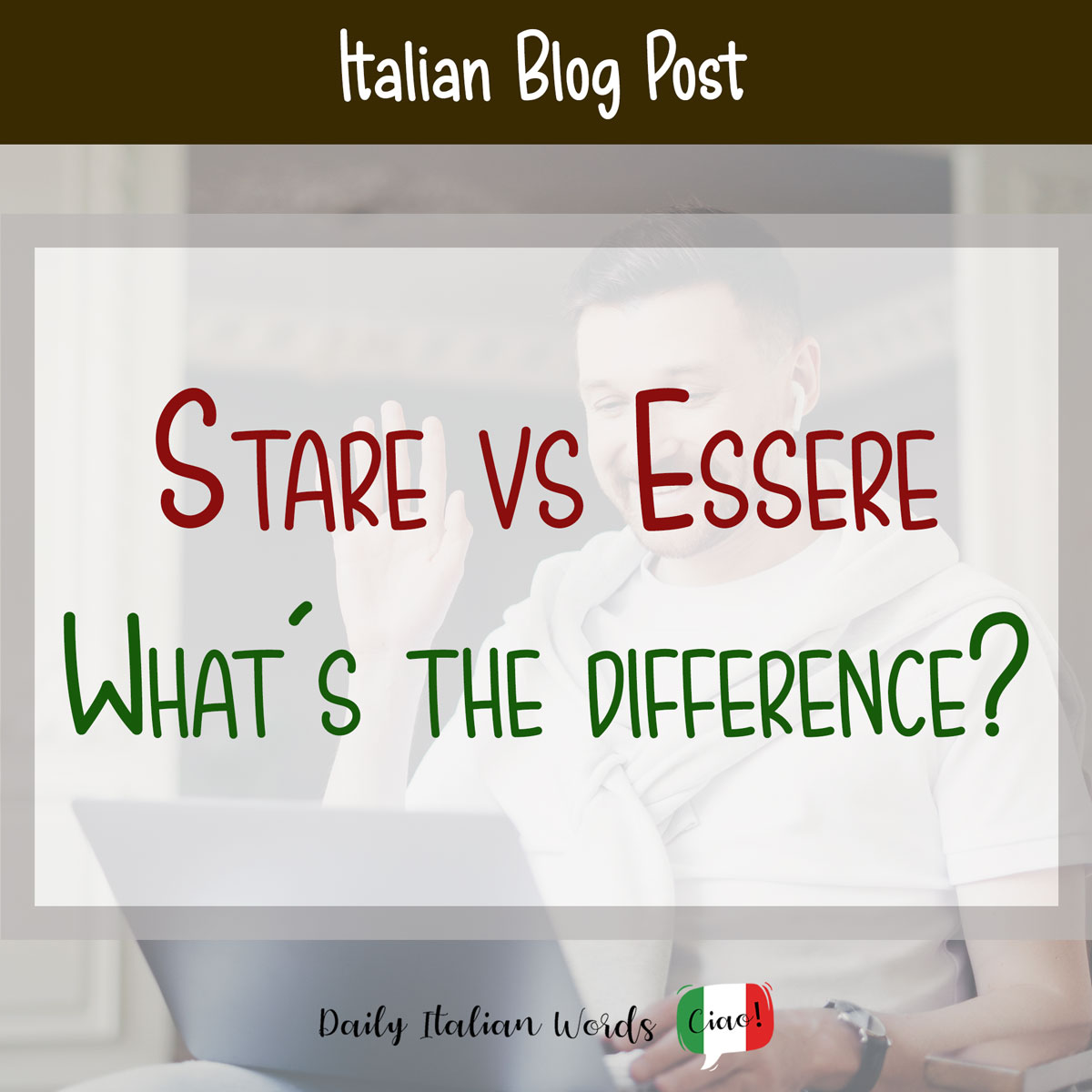
Stare vs Essere What's the difference between these Italian verbs
Italian verb conjugation stare in all tenses. Italian verb conjugation. Italian verb conjugation STARE. Print - Export to Word. Indicative | Subjunctive | Conditional | Imperative | Infinitive | Gerund | Participle . Indicative. Present. io sto tu stai lui sta noi stiamo voi state loro stanno. Present perfect. io sono stato

Conjugation Stare 🔸 Italian verb in passato prossimo, imperfetto
Stare (to stay) conjugation Italian 119 examples This verb can also mean the following: keep, be, be up to, live, be to, remain, stick Display translations Io Tu Egli/ella/esso Noi Voi Loro Present tense sto stai sta stiamo state stanno Present perfect tense sono stato sei stato è stato siamo stati siete stati sono stati Past preterite tense stetti
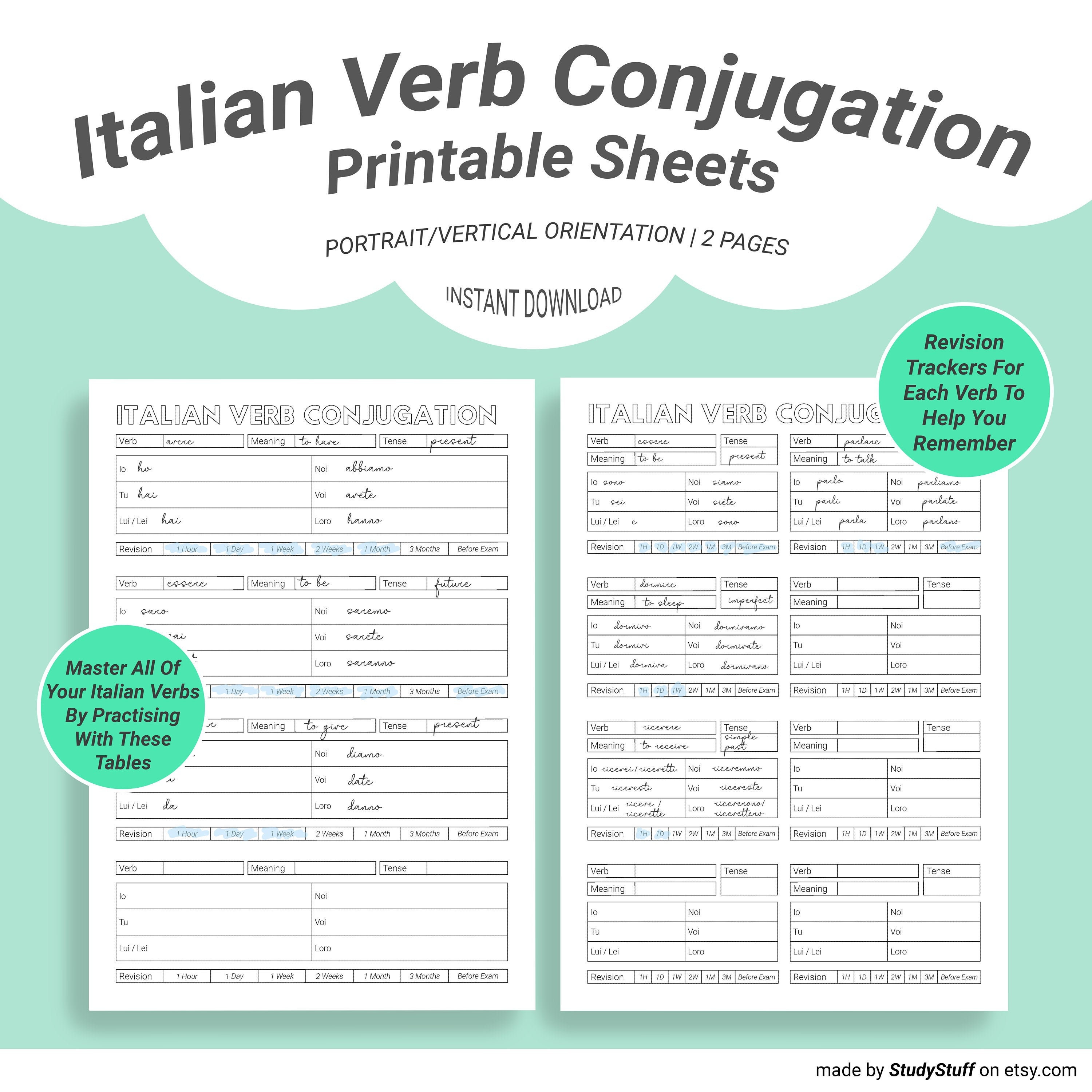
Italian Verb Conjugation Chart Pdf
If you're having difficulty with the Italian verb Stare, check out our online Italian lessons! Vatefaireconjuguer is a free online conjugator created by Gymglish. Founded in 2004, Gymglish creates fun, personalized online language courses: English course, Spanish course, German course, French course, Italian course and more. Conjugate all Italian verbs (of all groups) in every tense and mode.

Italian Conjugation Song Fare Stare Andare Dare Lingua Loops YouTube
'stare' conjugation table in Italian Go to the definition page of stare Indicative Subjunctive Imperative Infinitive stare Past Participle stato Gerund stando Indicative Present io sto tu stai lui/lei/Lei sta noi stiamo voi state loro stanno Imperfect io stavo tu stavi lui/lei/Lei stava noi stavamo voi stavate loro stavano Future
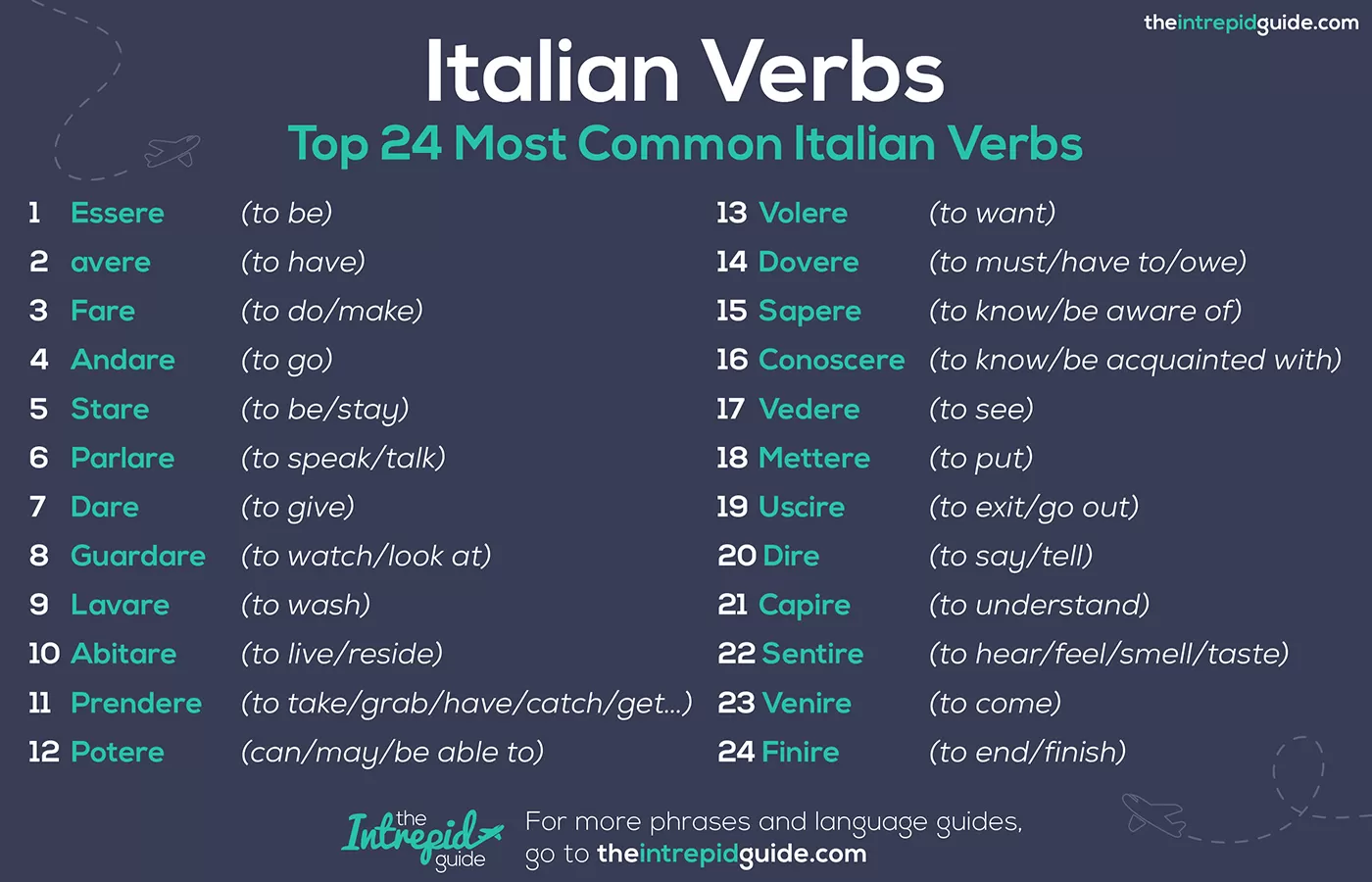
Top 24 Most Important Verbs in Italian (Plus PDF CheatSheet & Quiz) (2022)
Stare is an intransitive verb, meaning that it does not take a direct object. It's also an irregular verb and it does not follow the pattern of the verbs ending in "-are". Here is how to form the present tense of stare. Come stai? How are you? In questi giorni sto a Roma. These days I'm staying in Rome. Sto per uscire. I'm about to leave.

Stare to be, to stay 100 verbs in Italian! Learning italian, Italian
STARE verbo intransitivo della I coniugazione (ausiliare essere) coniugato nella forma attiva con ausiliare essere INDICATIVO PRESENTE io sto tu stai lui/lei sta noi stiamo voi state loro stanno IMPERFETTO io stavo tu stavi lui/lei stava noi stavamo voi stavate loro stavano PASSATO REMOTO io stetti tu stesti lui/lei stette noi stemmo voi steste

The irregular verb "stare" and how to use it Italian Verbs, Italian
Conjugation stare | Conjugate verb stare Italian | Reverso Conjugator Irregular verbs stare Infinito stare Gerundio stando Participio Passato stato Model : stare Auxiliary : essere Other forms: starsi / non stare Advertising Indicativo Presente io sto tu stai lei/lui sta noi stiamo voi state loro stanno Imperfetto io stavo tu stavi lei/lui stava

Conjugation Stare 🔸 Italian verb in passato prossimo, imperfetto
1st conjugation verb - stare is intransitive (essere auxiliary) stare feminine Translation stare stare to stay Indicativo (Indicative) Presente (Present) io st o tu st ai lui st a noi st iamo voi st ate loro st anno Passato prossimo (Present perfect) io sono st ato tu sei st ato lui è st ato noi siamo st ati voi siete st ati loro sono st ati
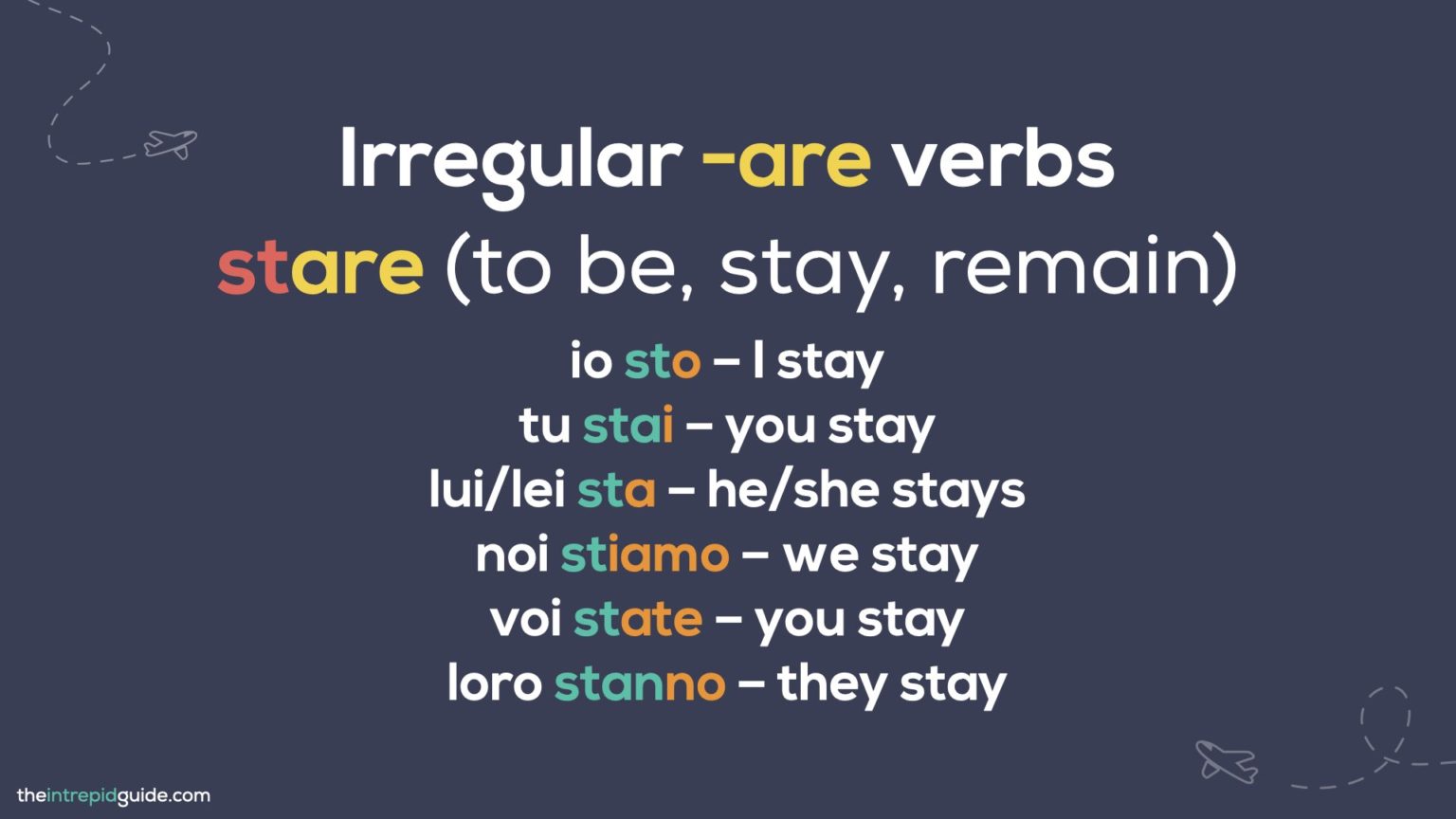
How to Conjugate Italian Verbs in 3 Simple Steps [Italian for Beginners
'stare' conjugation - Italian verbs conjugated in all tenses with the bab.la verb conjugator. bab.la - Online dictionaries, vocabulary, conjugation, grammar share

How to use Italian verb STARE YouTube
A list of the common conjugations for the Italian verb , along with their English translations. Past Historic / Passato remoto. This is a literary tense, i.e. a tense used in writing, in everyday speech the Passato Prossimo is used to refer to past actions. Pluperfect / Trapassato prossimo. Future Perfect / Futuro anteriore.
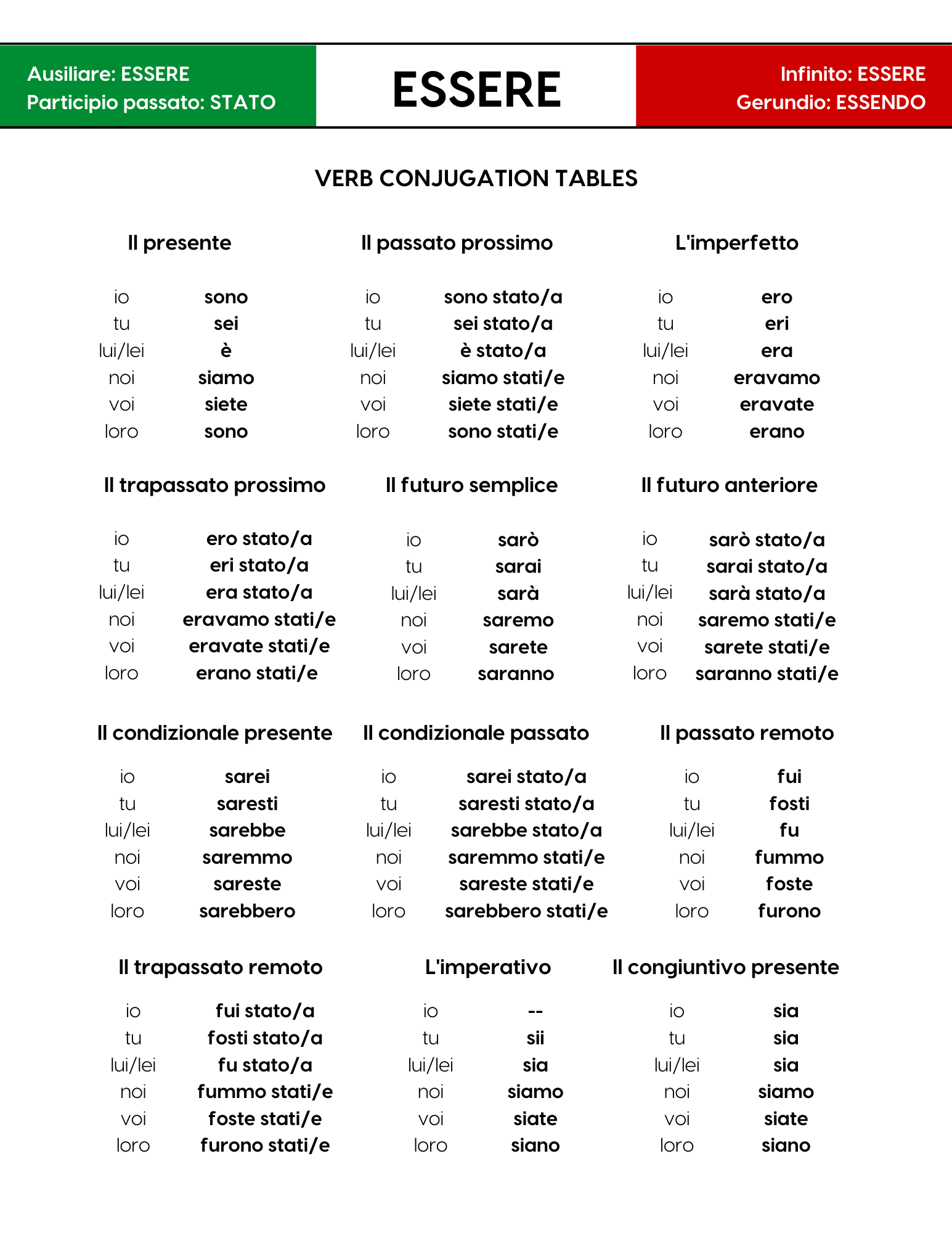
The Italian Verb Files Essere The Happy Maple Language Co
"Stare" is used to talk about all things, from how you're doing to where you're at in Italy, so it's best if you feel comfortable using this word in all its forms. What's more, it's an irregular verb, so it doesn't follow the typical "-are" verb ending pattern.